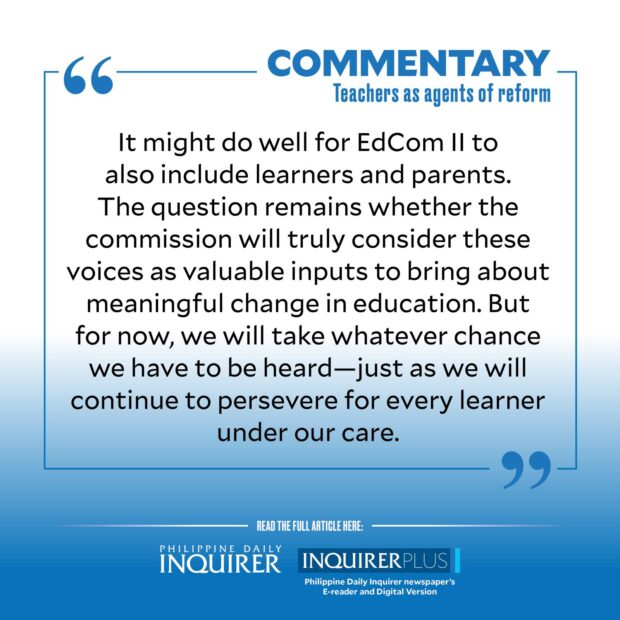The educational reforms in the Philippines have always been a challenge. We have faced various issues in the past, including learning loss and the pressure to meet future demands. The Second Congressional Commission on Education (EdCom II) has taken on the task of studying these educational gaps and proposing legislative solutions to address them. This commission consists of senators, congressmen, experts, and leaders in the education sector. However, the role of teachers in this review is often overlooked. They are often treated as passive recipients of educational reform instead of active agents of transformation. Teacher quality is identified as a problem in education, but this lack of quality is a result of long-standing dysfunctions within the system. Teachers, like students, are victims of a broken system that they are being asked to fix. Despite the challenges, teachers have silently shouldered the burden of ensuring learning happens by implementing government mandates. They have gone above and beyond their responsibilities to help students learn, even in difficult circumstances such as hunger, long distances from home to school, and abuse. However, teachers rarely get the opportunity to share their experiences and insights from the frontlines of education with policymakers. Including teachers in the discussion, giving them a seat at the table, and involving them in policymaking are crucial steps towards meaningful educational reforms. Fortunately, EdCom II recognized the importance of teacher input and provided an opportunity for teachers to be heard. A subcommittee on basic education organized a focused group discussion with 105 teachers from 74 schools across nine regions. This discussion covered a range of topics such as curriculum, teaching and learning resources, learning loss recovery, assessments, and school governance. One important aspect of the curriculum discussion was the need to prioritize certain topics due to limited time and resources. By decongesting the curriculum and focusing on foundational competencies, both teachers and students can benefit. The discussion also explored different teaching-learning approaches, emphasizing the importance of giving teachers the freedom to choose the methods that work best for them. Language of instruction was another significant topic, as teachers grappled with how to effectively teach abstract concepts to a multilingual student population. The consultation provided an opportunity for teachers to contribute their insights on why previous reforms have failed and offer ideas for effective solutions. It also allowed teachers to learn from one another, recognizing the uniqueness and similarities of different contexts. Teachers expressed empathy for each other’s struggles and celebrated their successes. The consultation ultimately centered around the central question: “What is best for our students?” It is important to note that the voices of learners and parents should also be heard in the education reform process. Including all stakeholders will lead to meaningful change. While it remains to be seen if EdCom II will truly consider these voices, teachers will continue to make their voices heard and advocate for the well-being of every learner.
Denial of responsibility! VigourTimes is an automatic aggregator of Global media. In each content, the hyperlink to the primary source is specified. All trademarks belong to their rightful owners, and all materials to their authors. For any complaint, please reach us at – [email protected]. We will take necessary action within 24 hours.


